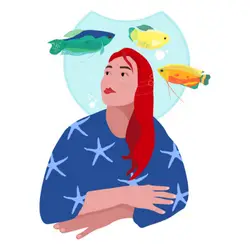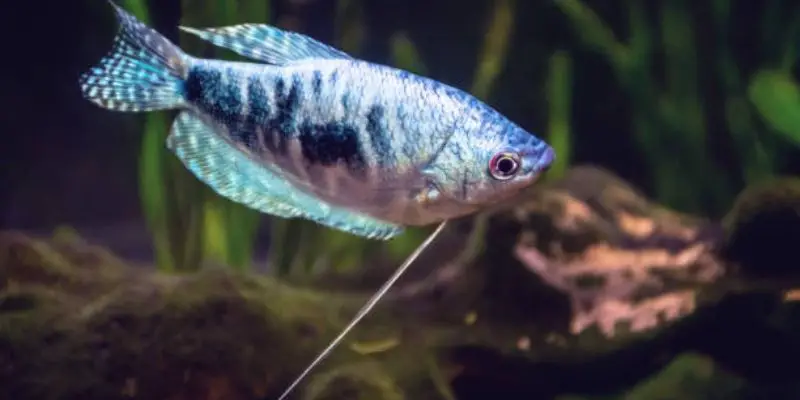If you recently purchased blue gourami and it is changing colors there are several possible reasons for the change. It could be normal coloration, pigmentation issues, or color loss due to improper care. Here is what you need to know about each of these possibilities:
Normal Coloration
Blue gouramis (Trichogaster trichopterus) are a naturally occurring color morph of the more common orange gourami (Trichogaster chuna). Blue gouramis have been selectively bred for many years and there may be specific strains within this species that produce fish with different shades of blue. Many breeders try to achieve a very dark blue color and in some cases, the fish may appear almost black.
Some blue gouramis may lose pigmentation with age, much like orange gourami that loses its bright orange coloration. This is normal and there isn’t anything you can or should do about it.
Another cause of a color change could be stress. Some specimens of blue gourami are more sensitive to environmental changes than others. Tropical fish may change color due to stress caused by poor or unstable water conditions, dissimilar water chemistry (i.e. pH) with the tank they came from, incompatible tank mates, or some other cause.
Blue gouramis may also lose pigment when they are getting ready to spawn. During this time the female will turn dark while the male becomes very light in color with some bluish tones.
- NUTRITIOUS TREAT: Omega One Freeze-Dried Blood Worms are an excellent high-protein treat for all...
- HIGH QUALITY INGREDIENTS: These full-bodied, authentic bloodworms are rich in vitamins and minerals
- SAFE ALTERNATIVE: Freeze-dried bloodworms are just as nutritious as live food, without the risk of...
Stress-Related Color Loss
If your blue gourami is changing colors due to stress it can usually be remedied by providing better care for your fish. Make sure you are following a strict water change schedule and performing weekly water tests with accurate results. Make sure the tank has a secure cover to prevent jumps or falls that could cause injury to your fish.
Avoid overstocking the aquarium with gouramis, as this may lead to territorial disputes between specimens. If there is more than one blue gourami in an aquarium they may not be able to establish a territory and this may cause stress. Make sure all specimens in the tank are the same size when purchasing new fish for your aquarium.
- First Defense for Freshwater Aquarium provides stress relief & naturally supports fish immune system
- Aids fish & other aquatic organisms as they adapt to new tank environments & poor water quality...
- Contains a mixture of vitamins & immunostimulants that promote wound healing & boost immune health
Incompatible Tank Mates
Blue gouramis should always be housed with other gouramis of a similar size and disposition. Other types of fish, especially those that are aggressive, nippy, or otherwise boisterous may harass your gouramis to the point of causing stress and color loss.
Housing blue gouramis with larger fish can also result in stress and color loss due to excessive intimidation. Make sure you select tank mates that are a similar size and have a disposition that is compatible with your gouramis.
Lack of Proper Nutrition
Blue gouramis are omnivorous fish that require a balanced diet of plant and animal material in order to stay healthy. If your specimen is not eating it may be stressed or have stopped eating due to malnutrition or old age. A lack of proper nutrition can cause stress-related color loss.
Provide your blue gourami with a variety of different types of fish foods including pellets, flakes, and frozen or live food. Feed the fish at least twice per day.
- Hardcover Book
- English (Publication Language)
- 922 Pages - 11/04/2021 (Publication Date) - Academic Press (Publisher)
Color Loss Due to Old Age
Omnivorous fish like blue gouramis will gradually lose their vibrancy over time if they are not fed a varied diet. Feed older specimens high-quality pellets or flake food, in addition, to live and frozen foods regularly to keep them healthy and their colors bright.
If you follow these steps, your fish should return to its normal coloration in no time! If you would like more information on keeping gouramis please visit the blue gourami profile page. Feel free to ask us any questions you may have in the comments below!





